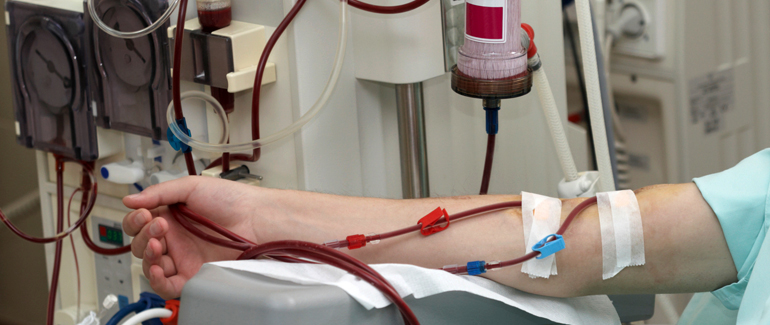
Dialysis Unit
A Dialysis Unit is a specialized facility within a hospital or a standalone center where individuals with kidney failure receive dialysis treatment. Dialysis is a medical procedure that performs the functions of the kidneys when they are no longer able to adequately filter and remove waste products and excess fluids from the blood. Here are key aspects of a Dialysis Unit:
Dialysis Treatment:
- Hemodialysis:
- Hemodialysis is the most common type of dialysis. It involves the use of a hemodialysis machine and an artificial kidney (dialyzer) to filter blood. The patient’s blood is circulated through the dialyzer, where waste products and excess fluids are removed, and then returned to the body.
- Peritoneal Dialysis:
- Peritoneal dialysis involves the use of the peritoneal membrane (lining of the abdominal cavity) to filter blood. A special solution (dialysate) is introduced into the abdominal cavity, and waste products pass from the blood vessels in the peritoneal membrane into the dialysate.
Components of a Dialysis Unit:
- Dialysis Machines:
- Hemodialysis machines are equipped with filters and monitors to facilitate the process of blood filtration. These machines are monitored by trained healthcare professionals.
- Dialyzers:
- Dialyzers, also known as artificial kidneys, are essential components that filter waste products and excess fluids from the blood during hemodialysis.
- Vascular Access:
- Patients undergoing hemodialysis require a vascular access point for blood to be removed, filtered, and returned. This may be in the form of an arteriovenous (AV) fistula, AV graft, or central venous catheter.
- Dialysis Chairs or Beds:
- Comfortable seating or beds are provided for patients during dialysis sessions, which can last several hours.
- Monitoring Equipment:
- Vital signs monitors and other medical equipment are used to monitor patients’ well-being during dialysis.
- Water Treatment System:
- Dialysis machines require ultra-pure water for the dialysis process. Dialysis units have specialized water treatment systems to ensure the water meets strict quality standards.
- Peritoneal Dialysis Supplies:
- For centers offering peritoneal dialysis, supplies such as dialysate solution, catheters, and connection devices are essential.
Dialysis Staff:
- Nephrologists:
- Kidney specialists oversee the medical management of patients undergoing dialysis.
- Nurses:
- Dialysis nurses are responsible for administering dialysis treatments, monitoring patients, and providing education on self-care.
- Dialysis Technicians:
- Technicians operate and maintain dialysis machines, set up equipment, and assist nurses during dialysis sessions.
- Social Workers:
- Social workers provide emotional support, counseling, and assistance with practical matters such as insurance and financial concerns.
- Dietitians:
- Dietitians help patients manage their nutrition, as diet plays a crucial role in the overall health of individuals undergoing dialysis.
- Patient Educators:
- Professionals who educate patients about kidney disease, dialysis procedures, and lifestyle modifications.
Dialysis Modalities:
- In-Center Hemodialysis:
- Patients receive hemodialysis treatments at a dedicated dialysis center, typically multiple times per week.
- Home Hemodialysis:
- Some individuals are trained to perform hemodialysis at home using specialized equipment.
- Peritoneal Dialysis:
- Peritoneal dialysis is often performed at home by the patient, offering more flexibility in treatment schedules.
Importance of Dialysis:
- Life-Sustaining Treatment:
- For individuals with end-stage renal disease (ESRD), dialysis is a life-sustaining treatment option when a kidney transplant is not immediately available or suitable.
- Management of Symptoms:
- Dialysis helps manage symptoms associated with kidney failure, such as fluid retention, electrolyte imbalances, and the accumulation of waste products.
- Improvement of Quality of Life:
- While dialysis does not cure kidney disease, it can significantly improve the quality of life for individuals with ESRD.
Dialysis units play a crucial role in the ongoing care and management of individuals with kidney failure, providing essential treatments that help sustain life and improve overall well-being.



